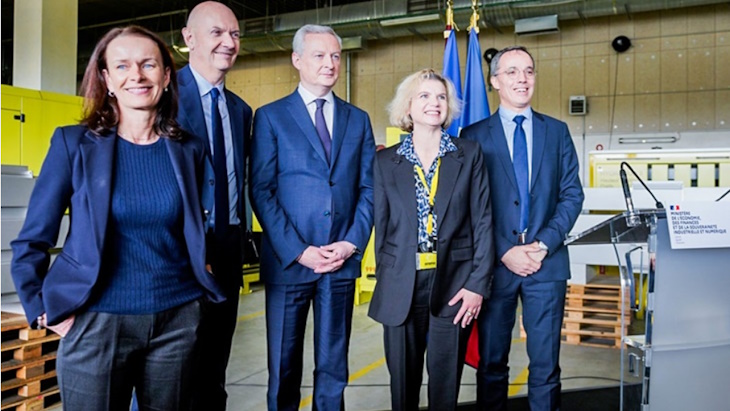
Lescure (second from left) and Le Maire (centre) pictured with La Hague Site Director Stéphanie Gaiffe (far left) and Orano CEO Nicolas Maes (on the right) during the visit (Image: Orano)
The announcement was made during a visit by Le Maire and Minister Delegate for Industry and Energy Roland Lescure to Orano's La Hague recycling site, days after France's Nuclear Policy Council (Conseil de Politique Nucléaire) said on 26 February that the country would continue with its closed nuclear fuel cycle strategy.
Le Maire announced three measures that will be taken towards this goal: a sustainability/resilience programme extending the life of the La Hague and Melox recycling plants beyond 2040; the launch of studies for a new MOX fuel fabrication plant at the La Hague site; and the launch of studies for a new used fuel processing plant, also at La Hague, by 2045-2050.
"A new page in French nuclear history is about to open. The time for large-scale national projects has returned and the nuclear energy sector has a central role to play," Le Maire said during his visit to La Hague.
In a post on X, Le Maire said the visit to La Hague by the two ministers sends a strong signal. "Thanks to this strategy, we will ultimately reduce the volume of nuclear waste by 75%," he said. "Our message is clear: nuclear power occupies a central place in the decarbonisation of our economy, the strengthening of our energy sovereignty and the reindustrialisation of our country."
Orano CEO Nicolas Maes said the announcements provide for major investments for the La Hague site. "Processing-recycling is one of the French industry's centres of excellence, representing know-how that has been mastered for some 50 years in our plants and of which all the group's employees can be proud," he said.
From the very beginning of its nuclear programme France has chosen to pursue a closed fuel cycle, reprocessing used nuclear fuel to recover uranium and plutonium for re-use. Reprocessing and recycling fuel in this way also significantly reduces the activity and volume of radioactive waste material requiring final disposal.
In the French model, the reusable materials which make up some 96% of used fuel are separated at La Hague. The plutonium recovered from this processing is reused in MOX (mixed-oxide) fuels manufactured by Orano at the Melox plant. Some 10% of nuclear electricity in France today is generated by recycling materials in the form of MOX fuel, Orano said, and this can rise to 25% and to almost 40% if used MOX fuel is further recycled.
Only the plutonium recovered from processed fuel is currently used in MOX. Reprocessed uranium - or RepU - can be re-enriched for use as fuel in existing light-water reactors. Four of France's reactors - at the Cruas-Meysse plant in Auvergne-Rhône-Alpes - are certified to use such uranium. In February, Cruas 2 became the first of those units to operate with a full core of fuel made from recycled uranium.